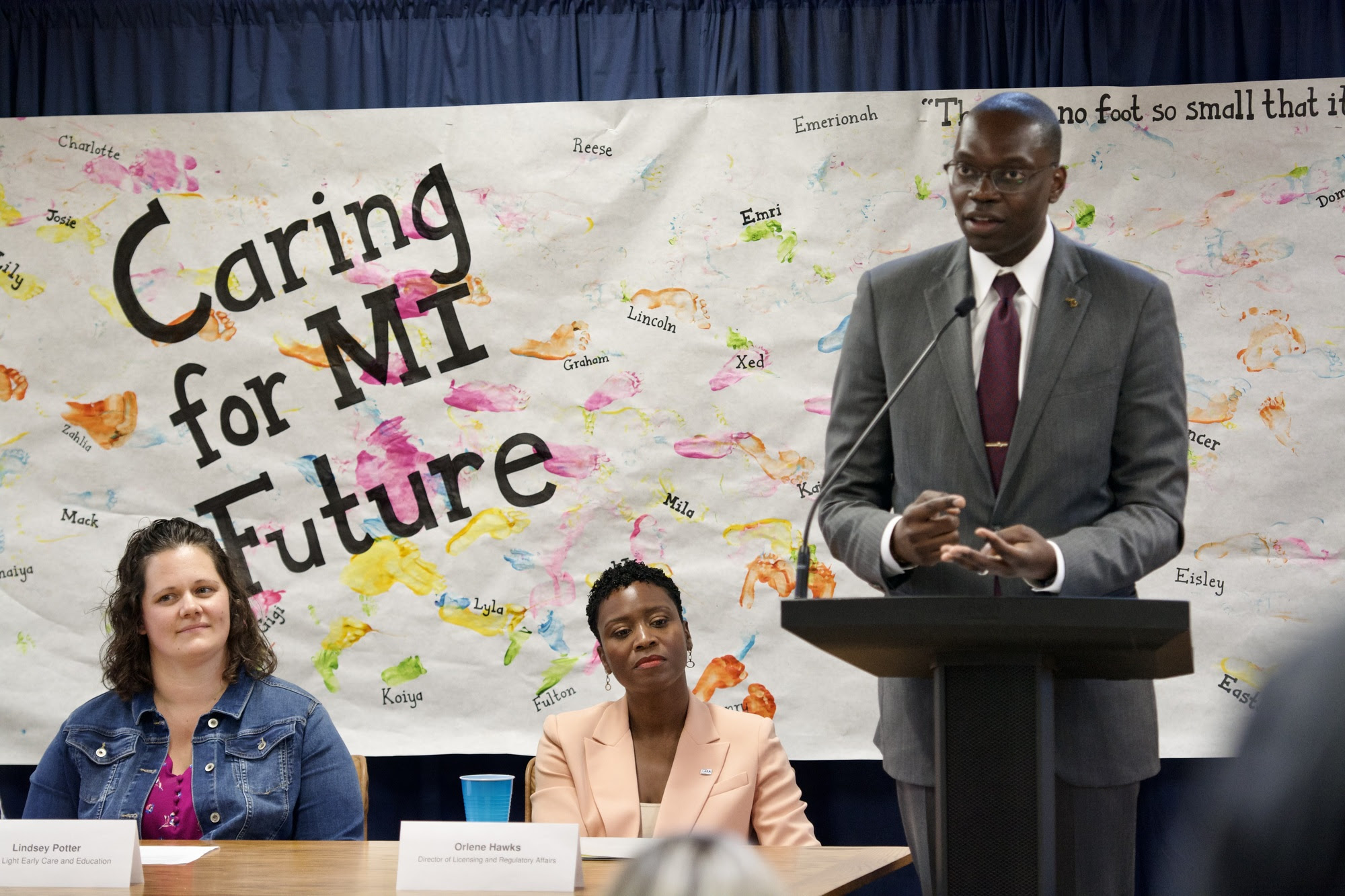
by Becky Andrus | May 23, 2022 | Regional News
Oakland County Extends Free Rabies Vaccine with Dog License Purchase Through End of June
- Free rabies vaccine clinics Tuesday mornings throughout June.
- Animal shelter will waive dog license delinquency fee for pet owners who participate.
- No appointment necessary.
Pontiac, Michigan – Oakland County Animal Shelter and Pet Adoption Center has extended its offer of a free rabies vaccine with the purchase of a dog license on Tuesday mornings through the end of June. Pet owners who take advantage of the offer also will not have to pay the dog license delinquency fee which begins after June 1.
Free rabies vaccines with the purchase of a dog license have been available at the Oakland County Animal Shelter and Pet Adoption Center in Pontiac from 9-11:30 a.m. on Tuesdays since April. To date, 375 pet owners have opted into the deal.
“Protecting your dog against rabies also protects your family and neighbors,” said Bob Gatt, Oakland County Animal Shelter and Pet Adoption Center manager. “We don’t want the cost of the rabies vaccine to be a barrier for anyone getting a dog license.”
If a dog is spayed or neutered, a dog license costs $15 for one year or $40 for three years. For a dog that is not spayed or neutered, those fees rise to $25 or $70, respectively. The three-year license requires a three-year rabies vaccine. Pet owners must bring proof of a prior rabies vaccination to get the three-year vaccine.
After June 1, dog license fees rise to $40 for a spayed or neutered dog for one year, $55 for a spayed or neutered dog for three years, and $85 for a non-spayed or unneutered dog for three years.
Michigan law requires licenses for all dogs as a public health measure to ensure dogs have their rabies vaccines. Plus, it makes it easier to return strays to their owners. For more information, go to www.oakgov.com/petadoption or call 248-858-1070.
About Oakland County Animal Shelter and Pet Adoption Center
Since 1980, the Oakland County Animal Shelter and Pet Adoption Center has been helping animals by providing shelter and care while attempting to reunite them with their owners or to find new homes. The shelter handles more than 4,000 animals per year. The new state-of-the-art shelter is located at 1200 North Telegraph, Building 42 East, in the city of Pontiac on the Oakland County Government campus. The shelter is 35,000 square feet and provides the very best in industry standards to the animals residing here.

by Becky Andrus | May 19, 2022 | Regional News

Media contact:
AG Press
FOR IMMEDIATE RELEASE:
Thursday, May 19, 2022
AG Nessel Joins Bipartisan Coalition Working to Protect Trafficking Survivors
LANSING – Michigan Attorney General Dana Nessel joined a bipartisan coalition of 41 attorneys general in asking the Consumer Financial Protection Bureau (CFPB) to support the intent of the Debt Bondage Repair Act in the agency’s rulemaking implementing recent amendments to Section 605C of the Fair Credit Reporting Act (FCRA).
The Debt Bondage Repair Act was signed into law in December 2021 and prohibits credit rating agencies from providing consumer reports that contain negative items about human trafficking survivors from any period during which the individual was being trafficked. It is a common tactic of traffickers to strip their victims of their financial independence or stability in order to keep them trapped. Even after they escape their trafficking, these survivors are often left with a wrecked credit history that leaves them unable to rent an apartment, purchase a car, or find employment.
“I remain committed to using a victim-centered approach with human trafficking survivors,” Nessel said. “It would be contrary to this approach to allow victims harmed by human trafficking to be further harmed – this time financially – by unauthorized debt taken out in their name by their traffickers. I am proud to stand with my colleagues in supporting the Debt Bondage Repair Act because one of the first steps in recovering from the ordeal of human trafficking victimization is regaining financial independence.”
As the Attorneys General note in their letter: “More than 1 in 4 survivors of human trafficking reported that a bank account or credit card which was opened in their name was then used or controlled by their trafficker. Traffickers can then mismanage the victim’s account, resulting in harm to their credit. This harm can linger for years after survivors have escaped their trafficking. Restoring financial independence is a crucial component of a survivor’s recovery. By regaining control over their finances, survivors reclaim and reassert their personhood in defiance of their traffickers. This takes bravery and time. Without some mechanism to help them, negative consumer reports that resulted from their trafficking become an almost insurmountable obstacle to simple tasks, like opening a bank account, renting an apartment, and applying for a job – all foundational steps as they try to get back on their feet. We welcome the Bureau’s proposal to implement the prohibition against reporting adverse information resulting from trafficking and to establish a method for submitting broadly-defined documentation of that trafficking, as contemplated by the Debt Bondage Repair Act.”
The letter was signed by Attorneys General of Delaware, Mississippi, Arkansas, California, Colorado, Connecticut, District of Columbia, Florida, Georgia, Hawaii, Illinois, Iowa, Kansas, Kentucky, Louisiana, Maine, Maryland, Massachusetts, Minnesota, Nebraska, Nevada, New Hampshire, New Jersey, New Mexico, New York, North Carolina, North Dakota, Ohio, Oklahoma, Oregon, Pennsylvania, Puerto Rico, South Carolina, South Dakota, Tennessee, Utah, Vermont, Virginia, West Virginia, and Wyoming.

by Becky Andrus | May 19, 2022 | Regional News

Governor Whitmer Signs Bills Expanding Resources for Victims of Crimes, Addressing Nursing Shortage, Other Legislation
LANSING, Mich. – Today, Governor Gretchen Whitmer signed House Bills 4674 and 4675 into law, which increase the amount of compensation available to crime victims and expand access to other vital services such as mental health resources. Governor Whitmer also signed House Bill 5089 and Senate Bills 166, 627 and 628. Together, this marks 829 bipartisan bills signed since Governor Whitmer took office.
“As a former prosecutor, public safety is a core issue for me. Today, I am proud to sign two bipartisan bills that support and empower victims of violent crimes,” said Governor Whitmer. “In my budget for the coming year, I’ve proposed funds to help local governments hire and train more first responders so we can ensure Michiganders feel safe at home and in their community. I will never stop fighting to protect Michiganders and will always work with anyone to protect public safety.”
“Without proper resources and assistance, those who survive a crime may never recover,” said Attorney General Dana Nessel. “I’m proud to support these bills and know the expanded eligibility will provide much-needed support that crime victims deserve.”
“I appreciate the Governors willingness to work with us and am privileged to be part of a team who are seeking to help crime victims get the help they need by removing roadblocks and giving them an extended time to apply so they don’t miss out on eligible assistance,” said Rep. Bradley Slagh, R – Zeeland.
“Public safety that doesn’t include the needs of crime victims is not true safety. Today, Governor Whitmer has made clear that Michigan stands with crime survivors and their families,” said Aswad Thomas, vice president at Alliance for Safety and Justice and national director of Crime Survivors for Safety and Justice. “As a crime survivor, I understand the emotional and physical toll of violence. These reforms will provide crime victims with the critical help to heal and recover from violence. Today, we’re united with one goal: to make Michigan safer for all.”
House Bill 4674 was Sponsored by Rep. Bronna Kahle, R – Adrian, and a copy can be found here.
HB 4675 was Sponsored by Rep. Bradley Slagh, R – Zeeland, and a copy can be found here.
Addressing the Health Care Worker Shortage
House Bill 5089 modifies the requirements an applicant must meet to be granted registration as a nurse aide by the Department of Licensing and Regulatory Affairs. House Bill 5089 adjusts training requirements without compromising the quality of training, which will help address the health care worker shortage.
“All Michiganders deserve access to affordable, high-quality health care and by allowing for more nurse aides to enter the field and receive vital training, we’re meeting the needs of the moment,” said Governor Whitmer. “Addressing these challenges with innovative and bipartisan solutions ensures everyone can succeed in Michigan. I will continue to work with anyone to improve our healthcare system.”
HB 5089 was sponsored by Rep. Ann Bollin, R – Brighton, and a copy can be found here.
Expanding Prescription Drug Refills Access
Senate Bill 166 allows pharmacists in Michigan to refill prescriptions authorized by a prescriber in another state or province of Canada. This allows those attending school, working, or traveling in Michigan from other states or Canada to maintain easy access to have their prescriptions refilled.
“I want to thank the governor for signing my bill SB 166 which would allow Canadian medical professionals to write prescriptions for Michigan patients similar to how doctors in Indiana and Ohio can,” said Sen. Curtis Vanderwall, R – Ludington. “It’s really about lowering costs and increasing access for Michiganders. There are so many folks in Eastern and Northern Michigan that travel to Canada and may get a prescription written for them while they are there. This will save them from having to get a second prescription written in the state, which translates into time and money. Common-sense solutions like this are what drive healthcare forward in Michigan, and I look forward to continuing to work my colleagues and the governor on improving affordability and access for Michiganders.”
Senate Bill 166 was Sponsored by Sen. Curtis Vanderwall, R – Ludington, and a copy can be found here.
Surveying the Michigan-Indiana Border
Senate Bill 627 and 628 establishes the Michigan-Indiana State Line Commission within the Department of Licensing and Regulatory Affairs, to recover and reestablish the Michigan-Indiana State Line. The Commission will be made up of five licensed surveyors from the five border counties. Upon completion of the survey, the commission is required to submit their findings to the legislature.
Senate Bill 627 and Senate Bill 628 were both sponsored by Sen. Kim LaSata, R – Niles, and copies can be found here and here.
|

by Becky Andrus | May 19, 2022 | Regional News

Governor Whitmer Signs Bills Fighting Opioid Crisis
$800 million dollars to be invested in treatment, prevention, mental health, other abatement efforts
LANSING, Mich. — Today, Governor Gretchen Whitmer signed a package of legislation investing $800 million dollars in treatment, prevention, mental health in response to the Opioid Crisis. Together, Senate Bills 993, 994, and 995 manage the disbursement of settlement funds as a result of opioid-related lawsuits and create the Opioid Advisory Commission to advance policy to prevent, treat, and support those with opioid use disorder.
“The opioid crisis touches families across our state, which is why it’s so crucial to ensure that Michiganders facing substance use issues have the support and resources they need to get better,” said Governor Whitmer. “The legislation I signed today will be instrumental in preventing more deaths and will provide Michigan families impacted by the devastating opioid epidemic with some semblance of relief. These funds will bring millions of dollars to support our neighbors, family, and friends in treatment and recovery. I will continue to work with anyone who wants to help those who are struggling.”
“Time is not on our side when it comes to Michigan’s opioid epidemic, so I applaud the bipartisan support that got these bills across the finish line and to Gov. Whitmer’s desk,” said Attorney General Dana Nessel. “I have spent the past couple of months visiting communities and organizations around Michigan to learn more about the work being done to prevent and treat Opioid Use Disorder, and while local governments will receive direct payments, the timely deployment of state settlement dollars is crucial in the fight against opioids in our communities. This puts us a step closer to getting the proper infrastructure in place to ensure settlement dollars can be used quickly and save as many lives as possible.”
“The opioid epidemic has been, and continues to be, devastating. While no amount of money from these lawsuits and settlements can bring back a lost loved one, it may help provide the funds needed to expand our efforts in combatting it,” said Sen. Betty Jean Alexander, D – Detroit. “The simple fact is, there is not enough support out there to help the thousands of people affected by opioid use disorder and opioid addiction. Senate Bill 995 being signed into law is essential not only to get all the money due to the state but is also a symbolic step forward by the Legislature to recognize and actively address the severity of this widespread crisis.”
“As a lead House sponsor on the Opioid Settlement package, it was an honor to work with Governor Whitmer, Attorney General Nessel, and my colleagues in the House and Senate to bring unprecedented resources for opioid recovery and healing to our state,” said Rep. Christine Morse, D – Texas Twp.
Senate Bill 993 creates the Michigan Opioid Healing and Recovery Fund in the Department of the Treasury.
Senate Bill 993 was sponsored by Senator Michael MacDonald, R – Macomb, and a copy can be found here.
Senate Bill 994 creates the Opioid Advisory Commission, which would review initiatives related to education, prevention, treatment, and services for individuals and families affected by substance abuse disorders and co-occurring mental health conditions.
Senate Bill 994 was sponsored by Senator Mark Huizenga, and a copy can be found here.
Senate Bill 995 creates a threshold for certain civil actions related to opioids. Enacting the bill would allow the State and local governments that have settled to receive full incentives under the settlement payment plans.
Senate Bill 995 was sponsored by Senator Betty Jean Alexander, D – Detroit, and a copy can be found here.
More information about the historic opioid settlements can be found through the Department of Attorney General’s website. Payments are expected to begin sometime this summer. The Department of Attorney General will release additional information when the payments begin.
|

by Becky Andrus | May 17, 2022 | Regional News

Governor Whitmer Announces Caring for MI Future Plan
The plan sets a bold goal to open 1,000 new child care programs by 2024 through $100 million investment to expand access to child care for working families and support child care providers
Battle Creek, Mich. – Today, Governor Gretchen Whitmer, Lieutenant Governor Garlin Gilchrist II, the Michigan Department of Licensing and Regulatory Affairs (LARA), and the Michigan Department of Education announced an ambitious goal to open 1,000 new child care programs by the end of 2024 and launched Caring for MI Future— a $100 million plan to get there.
“Nearly half of Michigan families live in a community without enough child care options to meet their needs. Lack of child care options means families are forced to leave the workforce, work fewer hours, or piece together child care options that don’t work very well for their family. That doesn’t work for kids, families, or employers,” said Governor Gretchen Whitmer. “That’s why I’m proud to have worked across the aisle to secure a $100 million bipartisan investment to launch the Caring for MI Future plan, which will dramatically increase access to child care across our state. Opening and expanding child care programs will connect more kids with quality early learning and help more families return to work knowing their kids are safe.”
“We have incredible child care entrepreneurs across the state, and right now, they’re standing tall for kids on a shoestring budget. The Caring for MI Future plan responds to the most pressing needs facing child care entrepreneurs and strives to create a more sustainable child care market in Michigan,” said Lt. Governor Garlin Gilchrist II. “This plan helps entrepreneurs create high quality facilities, secure early capital, recruit talented staff, and connect with technical assistance before they’re licensed. Investing in entrepreneurs means more Michigan kids and families have access to top notch child care in their communities. That’s good news for Michigan.”
“Quality child care programs are the silent drivers of our economy.” said Michigan Department of Licensing and Regulatory Affairs Director Orlene Hawks. “This investment will expand access to safe, quality, affordable child care across the state. LARA’s One-Stop Shop will help child care entrepreneurs find and create safe places to open their business, assist with start-up funding, connect them to child care education grants, and provide ongoing business supports to help them succeed.
“Caring for MI Future supports our expanding effort to do all we can to help our little ones get a great start and help their parents access quality child care,” said State Superintendent Dr. Michael Rice. “We have the resources and the opportunity in the state right now to make a significant difference for our children while helping drive an economy that can provide for children and families. This is a great bipartisan investment in Michigan’s future.”
“Bright Lights opened on February 1 of this year and the past three months are the culmination of a vision I’ve had for a while,” said Lindsey Potter, owner of Bright Lights Early Care. “I worked steadily for over a year on the licensing and business startup operations process and am excited to be a part of this announcement that will continue to support child care entrepreneurs like myself and the educators we employ.”
Caring for MI Future is a $100 million investment to help more Michigan families find quality, affordable child care in their community. Today, according to the Michigan League for Public Policy, nearly half of communities do not have enough child care options to meet demand.
To respond, the state is investing $100 million to dramatically increase access to child care across the state and open 1,000 new, or expanded, child care programs by the end of 2024. This strategy responds to the most pressing needs facing child care entrepreneurs and creates sustainable systems to support the current and next generation of child care business owners.
Through Caring for Mi Future, entrepreneurs will have access to:
- Support identifying and renovating facilities: Child care businesses need access to affordable, licensable spaces to care for kids. There will be $51.1 million in grant funding available to renovate and upgrade facilities to meet licensing and quality standards. Grant applications will be available in late summer 2022.
- Startup funding: Cashflow is an ongoing challenge for child care businesses, especially new sites that must incur costs well before they have revenue. The state will award $23 million in grants for programs before they’re licensed and immediately after receiving their license.
- Support to recruit staff: Entrepreneurs can’t open and expand their businesses if they can’t hire staff. The state will invest over $11.4 million to continue our statewide effort to recruit, train, and retain talented early educators that live and work in the communities they serve.
- Business development tools: Many new businesses benefit from support from the state and their community to assess market demands, identify space, comply with health and safety rules—including local zoning, and create a business plan. The state will invest $14.3 million to align these resources and make the startup and licensing process clearer and faster for providers.
For additional details on when specific grants will be available to entrepreneurs, visit Michigan.gov/childcare.
Caring for MI Future is part of a bipartisan $1.4 billion investment to expand access to quality, affordable child care and get Michigan families back to work. Child care is often the largest expense in a family’s budget and one in three Michigan families are now eligible for free or low-cost child care.
To qualify, families must:
- Have a child under age 13
- Need child care because they’re working or going to school
- Have a qualifying income.
- Your monthly income must be less than $2,686 for a family of 2, $3,386 for a family of 3, or $4,085 for a family of 4.
- Visit Michigan.gov/childcare for a complete list of reasons families may qualify for low or no cost child care and qualifying income levels for larger families.

by Becky Andrus | May 16, 2022 | Regional News

FOR IMMEDIATE RELEASE
May 13, 2022
Contact: [email protected]
Gov. Whitmer Coordinates Statewide Response to Baby Formula Shortage
Various state departments and attorney general take steps to support parents and tackle shortage head-on as governor calls Abbott leadership to offer state resources to fix supply chain
LANSING, Mich. – Today, Governor Gretchen Whitmer announced action that the State of Michigan is taking action to address the nationwide baby formula shortage. The governor brought together the Michigan Department of Health and Human Services (MDHHS), the Michigan Department of Agriculture and Rural Development (MDARD), including the Women, Infants, and Children Program (WIC), and Michigan Attorney General Dana Nessel to ensure parents who need formula get the resources and support they need to provide for their babies.
“Today I spoke with Abbott leadership and offered support to help get production back on track,” said Governor Whitmer. “I will do everything I can as governor to boost baby formula production, getting it from factories to store shelves and into people’s homes. I know how anxious parents must feel right now, and it’s crucial that they have confidence that a product is safe for their babies. I urge federal leaders to use every tool at their disposal to boost formula production. We’re tackling the shortage head-on in Michigan and working with our federal and private sector partners to fix supply logistics and ensure every baby has what they need.”
“Additionally at the state-level, I’ve taken action to lower costs and put money in people’s pockets. We’ve sent out $400 auto refund checks per vehicle to every Michigan driver and I proposed tripling the Earned Income Tax Credit in my budget to deliver a $3,000 tax refund for over 730,000 Michiganders, directly benefiting half the kids in Michigan,” Governor Whitmer added. “I will continue staying focused on lowering costs on essentials like formula, groceries, and gas for families by putting more money in their pockets and work with anyone to tackle supply chain challenges impacting Michiganders.”
DEPARTMENT OF ATTORNEY GENERAL
The Department of Attorney General’s Consumer Protection Team is committed to identifying and investigating any instances of price gouging related to the shortage.
“While we have not seen a significant influx of complaints thus far, my team will remain vigilant in ensuring this shortage isn’t compounded by illegal business practices that will only inflict additional harm on parents of infants right now,” Michigan Attorney General Dana Nessel said. “If you suspect instances of price gouging, please report it to our office so we can take appropriate action.”
MICHIGAN DEPARTMENT OF HEALTH AND HUMAN SERVICES
MDHHS released new guidance to help parents navigate the dos and don’ts as supply chains challenges and recalls resulted in limited supply around the country.
DOS: The department recommends that families do consider trying another brand of formula as most regular baby formulas are enough alike that most healthy babies can switch without problems. It is important that babies be fed an appropriate substitute if their usual formula is not available. All standard infant formulas for healthy babies meet the same FDA high standards for quality and nutrition.
DON’TS: The department recommends that families don’t feed their babies homemade formula, or ‘water down’ formulas to stretch them out, as these are unsafe practices.
If you have concerns about infant formula, contact your health care provider or FDA at 1-888-INFO-FDA (1-888-463-6332), or file a report online at MedWatch. Contact your child’s healthcare provider if you are unable to access the formula your child needs.
Learn more safety information on infant formula by clicking the following link:
WOMEN, INFANTS, AND CHILDREN PROGRAM
In response to the Abbott recall, Michigan has temporarily expanded access to alternate formula options that qualify for WIC assistance, to ensure families can use their benefits on formulas readily available. Approximately 85% of formula-fed WIC participants are affected. The most up-to-date information on WIC’s response to the formula recall can be found at Michigan.gov/WIC.
Michigan notified clients with food packages that contain potentially recalled formulas and directed them to step-by-step instructions on what to do for benefits already redeemed, unredeemed benefits, and special formulas.
Michigan WIC staff are available to guide WIC clients to stores where a certain formula has been recently purchased. Some families may need to consider a formula change to one that is available, and in these cases, it is recommended families talk to their health care provider or WIC clinic for the best options.
U.S. DEPARTMENT OF HEALTH AND HUMAN SERVICES
The U.S. Department of Health and Human Services has set up a website to ensure Americans have accurate, up-to-date information about baby formula. Learn more about the federal response by clicking here: https://www.hhs.gov/formula/index.html
Baby Formula Manufacturer Hotlines
MyGerber Baby Expert: call 1-800-284-9488
Abbott’s Consumer Hotline: call 1-800-986-8540
Reckitt’s Customer Service line: call 1-800 BABY-123 (222-9123)
|












